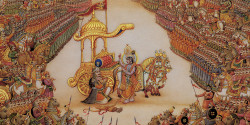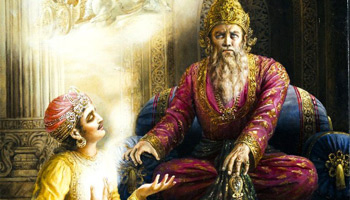For some reason I have come to experience the Bhagavad-Gita as a radio program. Why? Mainly because a man named Sanjaya narrates the legendary tale and philosophical exchange as it unfolds to a blind king.
In case you haven’t read “The Gita” lately, a quick summary:
Once upon a time two royal families dwelled in the Northern Indian kingdom of Kurukshetra, they being the offspring of Pandu and the entourage of his brother king Dharitarashta, whose congenital blindness did not stop him from producing one hundred (yes way) sons. They have come to blows because of a complicated succession of divine and earthly mishaps. Following the death of the great monarch Bharata, Pandu inherits the throne, largely because of Dharitarashta’s seeing problems. But somebody has inflicted a curse of sterility on the new ruler and he cannot produce heirs for the land. Hence he goes off to the forest (wouldn’t you?) and there, with the help of various gods, fathers five sons who become known as the Pandava Brothers.
The Pandavas study martial arts and spirituality and win the favor of the god Krishna. Most everyone of repute seems to agree that they ought to rule Kurukshetra. But one of Dharitarashta’s sons refuses to acknowledge the proverbial memo, he being Duryodhana. Ambitious and clever, Duryodhana defeats the Pandavas in a rigged ritual dice game. Apparently the latter had bet nothing less than their presence in civil society, plus some wives (oops). Back to the woods they go for another 13 years until their agreed upon period of exile has concluded.
When they return, they return for war: the Pandavas and their supporters versus Duryodhana and his 99 kinsmen. Both armies meet in the great field of Kuru in Kurukshetra. But suddenly the presumptive leader of the Pandavists, Arjuna, gets cold feet. He asks his charioteer, who happens to be Krishna, to take him to the center of the theater of combat just before the battle begins. There Arjuna surveys both sides, all of whose participants count as relatives, and suddenly asks, is this trip really necessary?
“I see omens of chaos,
Krishna; I see no good
in killing my kinsmen
in battle.”
One imagines both armed assemblies of Hindu Tough Guys witnessing this interruption and typing “WTF??” on their respective Facebook or Twitter mobile accounts. Nonetheless, a profound conversation between Arjuna and Krishna ensues. Krishna asks Arjuna and presumably the rest of us to detach ourselves from the immediate moment and to find our sacred duty, our “dharma,” instead. Once liberated from the burden of immediate expectations we can focus on the larger battle or journey. Fate will decide our fortunes; we must discover Our Cause.
Why do I identify a radio program in this great story? Because the whole sacred shebang flows from a request by old king Dharitarashta for live coverage of the event. He can’t fight or even see, so the ancient sage Vyasa appoints Duryodhana’s charioteer Sanjaya to function as a sort of psychic, panoptic (all-seeing) witness to the war:
“Sanjaya shall see all the events of the battle directly. He shall have a divine inner eye . . . O King, Sanjaya . . . will tell you everything about the battle. He will be all knowing. Whenever he thinks with his mind, Sanjaya will see everything taking place during day or night, in public or in secret.”
Thus Dharitarashta gets a blow-by-philosophical-blow mind/audio narrative of the debate that we subsequently process in written form. It sort of reminds me of those old baseball radio announcers who received ongoing telegraph messages of the day’s big game and creatively turned the missives into a real-time narrative for their listeners.
By the way, audio versions of The Bhagavad-Gita abound on the web, especially in YouTube-land. You can subscribe to various Gita-related podcasts too. The above admittedly rough summary of the text flows from Barbara Stoler Miller’s excellent translation and introduction. Read (or listen) and learn and enjoy.




